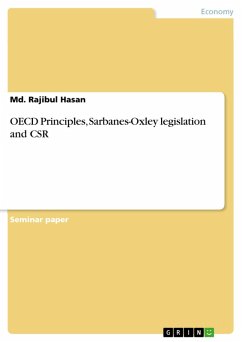Seminar paper from the year 2011 in the subject Business economics - Business Ethics, Corporate Ethics, grade: Distinction, University of Lincoln, language: English, abstract: In recent years, Corporate Social Responsibility (CSR) and Corporate Governance has been widely explored with a number of reports and codes of practice aimed at decreasing instances of what are seen as grossly unethical ways of managing major organizations. Quite apart from the strictures of moral theory, there is considerable danger to the reputation of quoted companies if shareholders feel that they do not believe the information presented to them by company directors and senior executives. Any general lack of confidence in the financial probity of companies could be very damaging to the economic system as a whole. If entrepreneurs and senior managers want unjustified large salary instead of paying attention to the wishes of shareholders, then conflict happened (Harrison, 2005). Thus, the developments of the Corporate Governance Codes like Cadbury Report, OECD principles, Sarbanes-Oxley Act etc have been driven by financial scandal, corporate collapse, or similar crisis. CSR has developed the idea of corporate governance in order to encourage management to take broader ethical considerations into their account. The introduction of corporate governance codes has been motivated by a desire for more transparency and accountability, and a desire to increase investor's confidence in the stock market as a whole (Mallin, 2007). This essay presents a critical discussion of the OECD Principles and the Sarbanes-Oxley Act for corporate governance within the context of high profile businesses. Later, it will present the significant differences in focus and intend between OECD and Sarbanes-Oxley. Moreover, it will critically discuss the convergence of Corporate Governance and Corporate Social Responsibility (CSR).
Dieser Download kann aus rechtlichen Gründen nur mit Rechnungsadresse in A, B, BG, CY, CZ, D, DK, EW, E, FIN, F, GR, HR, H, IRL, I, LT, L, LR, M, NL, PL, P, R, S, SLO, SK ausgeliefert werden.









